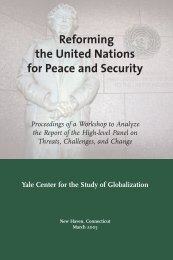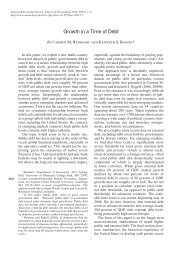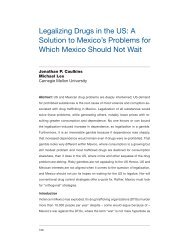The collapse of global trade, murky protectionism, and the crisis:
The collapse of global trade, murky protectionism, and the crisis:
The collapse of global trade, murky protectionism, and the crisis:
You also want an ePaper? Increase the reach of your titles
YUMPU automatically turns print PDFs into web optimized ePapers that Google loves.
<strong>The</strong> <strong>collapse</strong> <strong>of</strong> <strong>global</strong> <strong>trade</strong>, <strong>murky</strong> <strong>protectionism</strong>, <strong>and</strong> <strong>the</strong> <strong>crisis</strong><br />
...<strong>and</strong> <strong>global</strong>ly<br />
<strong>The</strong> regional agenda has to be complemented by decisive action on <strong>the</strong> multilateral<br />
stage, addressing some <strong>of</strong> <strong>the</strong> very same issues, but <strong>of</strong> course with different instruments.<br />
It is <strong>the</strong> best interest <strong>the</strong> region to streng<strong>the</strong>n an institution such as <strong>the</strong> WTO,<br />
which can provide not only <strong>the</strong> necessary tools to address <strong>the</strong> coordination failures<br />
involved in <strong>trade</strong> negotiations, but also a safe haven for relatively small <strong>global</strong> <strong>trade</strong>rs,<br />
as it is <strong>the</strong> case for most countries in <strong>the</strong> region, against <strong>the</strong> asymmetry <strong>of</strong> bargaining<br />
power, <strong>the</strong> distortions <strong>and</strong> discrimination practices that can arise from bilateral <strong>and</strong><br />
regional negotiations.<br />
Proposals put forward by o<strong>the</strong>rs such as an increase in surveillance <strong>of</strong> <strong>trade</strong> measures,<br />
a <strong>global</strong> pledge to a st<strong>and</strong>still <strong>and</strong> a "big-push" towards <strong>trade</strong> facilitation can all<br />
be considered in <strong>the</strong> best interest <strong>of</strong> LAC. Even though <strong>the</strong> details have to still to be<br />
worked out, <strong>the</strong>y seem to be <strong>the</strong> best available options to counter <strong>the</strong> worst protectionist<br />
pressures that are already beginning to arise. <strong>The</strong>re is no better institution to<br />
take <strong>the</strong> lead in advancing <strong>the</strong>se proposals than <strong>the</strong> WTO <strong>and</strong> governments in LAC<br />
would be acting in <strong>the</strong>ir own best interest if <strong>the</strong>y provide all <strong>the</strong> necessary political<br />
<strong>and</strong> material support. <strong>The</strong> worst that can happen is leaders to be complacent about<br />
any deterioration <strong>of</strong> <strong>the</strong> <strong>trade</strong> environment.<br />
Doha Round<br />
As important as <strong>the</strong> short-term is, leaders would be well-advised not to lose sight <strong>of</strong><br />
<strong>the</strong> more ambitious, long-term goals, which can be best summarized by <strong>the</strong> aspirations<br />
<strong>of</strong> <strong>the</strong> Doha Round. It is hard to overestimate <strong>the</strong> importance <strong>of</strong> completing<br />
<strong>the</strong>se negotiations for a region that is endowed with one <strong>of</strong> <strong>the</strong> most competitive agricultures<br />
in <strong>the</strong> world <strong>and</strong> that is also striving to diversify its exports <strong>and</strong> markets. For<br />
all its benefits, regional integration alone cannot come close in providing <strong>the</strong> same<br />
growth opportunities that can be found in an open, <strong>global</strong> economy. O<strong>the</strong>r initiatives<br />
that were put toge<strong>the</strong>r during <strong>the</strong> negotiations <strong>of</strong> <strong>the</strong> round, such as Aid for Trade,<br />
also deserve to be kept alive more than ever to make sure <strong>the</strong> benefits <strong>of</strong> <strong>trade</strong> are<br />
widely spread <strong>and</strong> political support for free <strong>trade</strong> does not falter.<br />
<strong>The</strong> challenges <strong>and</strong> complexities <strong>of</strong> this multidimensional strategy are nothing<br />
short <strong>of</strong> daunting, but <strong>the</strong> pay<strong>of</strong>f is clear. Keeping <strong>the</strong> <strong>global</strong> <strong>and</strong> regional economy<br />
open is arguably <strong>the</strong> best governments can do to safeguard <strong>the</strong> long-term growth<br />
prospects <strong>of</strong> <strong>the</strong>ir economies. If history is any guide, this is an underst<strong>and</strong>ing that<br />
should be particularly dear for us in Latin America <strong>and</strong> <strong>the</strong> Caribbean.<br />
About <strong>the</strong> author<br />
Luis Alberto Moreno is president <strong>of</strong> <strong>the</strong> Inter-American Development Bank since 2005, having<br />
previously served as Colombia's Ambassador to <strong>the</strong> US for 7 years. Prior to his post as<br />
Ambassador, Moreno served in both <strong>the</strong> public <strong>and</strong> private sectors in Colombia, including as<br />
Minister <strong>of</strong> Economic Development <strong>and</strong> President <strong>of</strong> <strong>the</strong> Instituto de Fomento Industrial, <strong>the</strong><br />
Colombian government's industrial finance corporation, <strong>and</strong> a holding company for many <strong>of</strong><br />
<strong>the</strong> largest state enterprises in <strong>the</strong> country, where he led a successful privatisation program<br />
<strong>and</strong> developed new financing instruments for private industry.<br />
23





